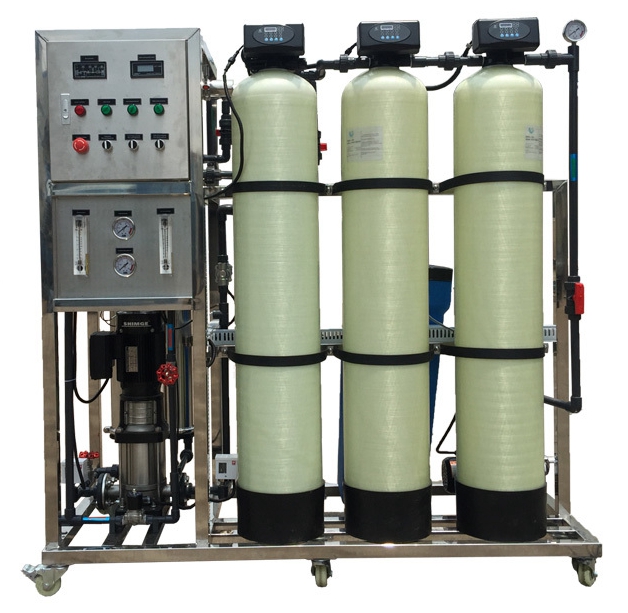Many people asked about the water requirements of bread in the food industry. They thought that the amount of water used for bread processing was very small and did not need to pay special attention to the water quality, Feel free to use. In fact, water is one of the basic raw materials for bread processing. Bread processing on the quality of water also has special requirements. Due to the presence of water, flour can form the dough with viscous flow characteristics, can carry out a series of physiological and biochemical reactions, such as yeast growth and finally can be processed into bread.

The water used to make the bread is alkaline, temperature, colorless and tasteless, harmless microorganisms, no heavy metal virus bacteria are allowed and the drinking water quality standard should be met. In addition, there are corresponding requirements for hardness.
Alkalinity
The ideal bread has a pH of 5-6, while the yeast can survive at a pH of 3.0 to 7.5, but the most suitable environment is between 4.5 and 5.0. It can be seen that it is ideal for dough or yeast. The pH values are all acidic. Obviously, the ideal pH of bread processing water should be controlled to be slightly lower than 7. The water with too high alkalinity is not conducive to the growth of yeast. At this time, lactic acid can be added for neutralization. Acidic water helps the dough to ferment, but the acidity High will affect the expansion volume of the bread. In life, senior experts who make bread sometimes add a few drops of white vinegar to make bread, which can reduce the bitterness of the bread and increase the softness of the bread. The principle is to make the dough weakly acidic by adding white vinegar. Thereby creating a better fermentation effect. However, for large companies specializing in the food industry, a large amount of water is used every day. If white vinegar is added to the water according to the traditional water treatment method, the amount of white vinegar is often not well controlled, which may result in unstable water PH value. Ocpuritech supply RO machine that produced pure water by the PH value is less than 7, which meets the requirements of the large food industry of company for the PH value of water quality. Pure water can be used to direct produce food, which is convenient and safe and stable.
Temperature
The temperature is different for baked products with their own specific temperature conditions. If the temperature is too low, the yeast will dormant which will affect the fermentation speed of the yeast and prolong the production cycle. If the temperature is too high, although the fermentation time will be shortened, it will create favorable conditions for the growth of other bacteria (such as lactic acid bacteria and acetic acid bacteria) and increase the dough temperature. Will reduce the quality of the bread, usually the temperature will exceed 68° C, the yeast will die. Since the optimum growth temperature of yeast is 25-20° C, it is usually necessary to control the dough between 25-30° C. It is a convenient and cost-effective method to adjust the water temperature in order to achieve a suitable temperature for the dough.
Smell of water, color, heavy metals and viruses
Secondary Pollution of Tap Water from Waterworks to Company’s Galvanized Pipe Caused by Long-Term Use or Corrosion of Pipe Material Quality Problems, At the same time, the smell of bleach when the tap water smelts, indicating that the excess chlorine in tap water may exceed the standard and that the polluted water is used in the food industry, greatly reducing the taste of the food. RO machine with automatic carbon filter can remove the color, free chloride, organic matter, harmful matter and it can remove perfectly over 99% ions. The biggest feature is that it can remove heavy metals and bacteria.
Hardness
Hardness is the ability of metal ions to precipitate in water. For every 1,000 milliliters of water, calcium oxide above 18 milligrams of water is called hard water and less than 4 milligrams is called soft water. Bread processing water requirements should be moderate namely 8-16 degrees. Neither hard water nor soft water is suitable for bread making. Hard water enhances gluten toughness because of the presence of calcium and magnesium ions, High hardness will make the dough dry and hard, the bread taste rough, easy to drop slag, lengthen the bread fermentation time; Soft water makes the dough too soft and sticky and shortens the fermentation time but if it is too soft the bread collapses easily. Generally, sweet bread and toast are suitable to use hard water to increase toughness and prevent bread limp. The baguette is suitable for soft water to extend the mixing time to a certain extent and inhibit the production of gluten. RO machine for softening filters to improve the softness of water in large and upscale bakeries. Water softener is using cation resin to remove salts of calcium iron and magnesium that may form scale encrustations. The pure water of Ocpuritech provides RO machine with pretreatment which is soft water that can be used directly to make bread.

Ocpuritech produce RO machine with pretreatment such as sand filter, carbon filter and softener. It is a whole set solution to solve your water problem in food industrial perfectly.Clip above photo to learn more detail.

